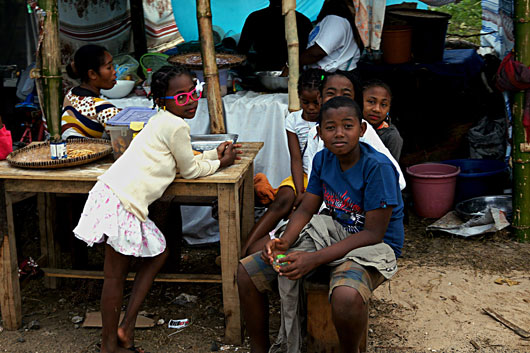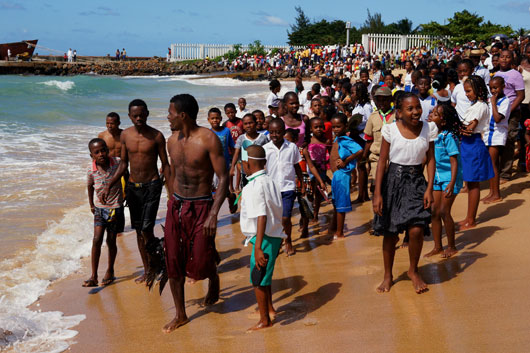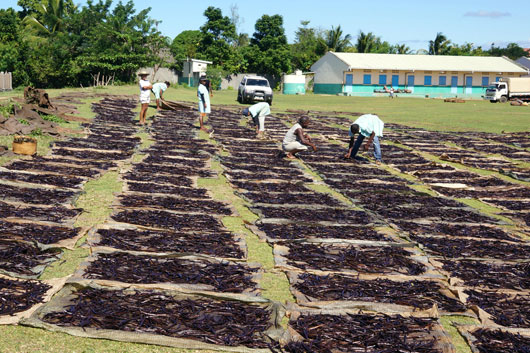
We — myself, my wife and our two year old boy — line up along the beach with everyone else — hundreds of people dressed in their Sunday best, standing or sitting on the wall, all of them facing the ocean. We wait, for what we were not sure. Palpable excitement is in the air. The adults are smiling, patiently corralling the children who could not contain themselves, laughing and chasing each other up and down the surf. Then, a speedboat races around the bend of the port of Antalaha and begins throwing ducks overboard, one every hundred feet or so. Out of the crowd, a group of young men step forward, stripped to their waists. They dive into the surf, swimming hard for the ducks bobbing up and down in the choppy waves. Of course, we say to ourselves, an old fashioned seaside duck grab. As the swimmers near the ducks, the crowd’s excitement crests and there is screaming and cheering when the first man grabs hold of the first duck. But the ducks are in their element whereas the men are not and in the swim back to shore, the duck would change hands many times and each time an approving roar would rise from the crowd. As the contest wears on, some men return to the shore empty handed and exhausted; others emerge victorious, the winner of a duck and the general adulation of the spectators. One of the last men to come out of the water holds — improbably — two ducks in one hand and he is swarmed as he gets out of the water like a rockstar stepping out of from his tour bus.

This was our fourth day in Antalaha, Madagascar and it just happened to be Independence Day, a bigger deal here — we are told — in the vanilla-rich coastal town than anywhere outside the capital. We had come for a five week stay in this town to learn more about the vanilla business and the illegal rosewood trade that was supplanting it as a source of wealth for the local economy. The cultivation and export of vanilla in the Sava region of Madagascar has been big business since the 19th century, when former slave Edmond Albius figured out how to pollinate the vanilla orchids by hand, thereby wresting control of vanilla production away from Mexico. The wealth generated by vanilla is as ubiquitous here as the wafted scent of sun-cured vanilla, a scent that pours in every open window during the late morning and early afternoons, a scent that resembles more the smell of the stacks in a reputable old library than it does the extract one might use in a pound cake. New SUVs share the road with decrepit Peugeots and Renaults and walled mansions can be seen peeking out from the lean-tos and shacks that dot the road side. Much of this ostentatious wealth was created in the early 2000s when a tropical cyclone wiped out most of Madagascar’s vanilla crop, driving prices and profits to record highs. A few years later, competition, overproduction, and the increased use of synthetics by the food industry led to a precipitous drop in the price and it is thought that many people here turned to the illegal trade in endangered rosewood. The demand for the wood was being driven largely by the rise of the Chinese middle class, who valued the wood not only for its physical properties but also its cultural heritage. Rosewood is used by the Chinese in the manufacture of traditional Ming Dynasty-style furnishings, which are often traded and sold at great price as investment or legacy pieces.
This international dynamic, which pivots around this town and others like it in the Sava region of Madagascar, is the reason why we’re here. But a few things have waylaid our serious intellectual inquiries: flying over 20 hours and across three countries with a two year old in tow for one; the pristine and majestic beaches that stretch for miles and miles for another. Oh and there’s the week long block party known as Independence Day. After the duck grab, starting right around dusk, the locals will gather at le plage for a kermesse, an all night long fete celebrating the good life in this beautiful town by the Indian Ocean. Who could resist?

Read Ethical Traveler's Reprint Policy.
